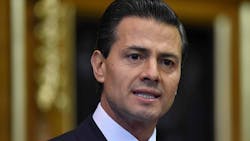Mexico’s government began a formal 90-day consultation process with the nation’s business community that’s needed before the start of talks to revise NAFTA and must be prepared for all scenarios, the country’s top diplomat said.
Foreign Relations Minister Luis Videgaray on Wednesday said his visit to Washington last week was to lay the groundwork for collaboration with President Donald Trump’s government and not to negotiate details of trade for any specific industries. Talks will begin in May, and Mexico also will work to diversify its relationships, seeking to reach free-trade agreements with partners from the Trans-Pacific Partnership agreement who aren’t already covered by bilateral deals, including Australia, New Zealand, Malaysia and Singapore, Videgaray said.
Mexico’s government will speak with representatives from industries such as agriculture, auto manufacturing and textiles about the North American Free Trade Agreement’s impact over the past two decades as the U.S. goes through a similar process, Videgaray said. President Enrique Pena Nieto’s administration continues to expect a positive outcome from talks with the U.S. on areas from trade to security and immigration, and took some positive signs from last week’s meetings despite Trump’s insistence that Mexico pay for a border wall and the cancellation of a sitdown between the leaders, Videgaray said.
"We want to reach an agreement, and we’re going to reach an agreement," Videgaray told reporters in Mexico City on Wednesday. "But we need to be prepared for all scenarios."
As a candidate, Trump repeatedly promised to end or overhaul NAFTA, saying it has led to companies moving factories to Mexico, eroding employment in the U.S. Mexican officials have said they’re open to updating NAFTA to incorporate industries like digital commerce and energy that weren’t included when the agreement was negotiated in the early 1990s.
Trump has threatened a 35% tax on General Motors Co. and Toyota Motor Corp’s imports, which would be barred under NAFTA as currently written but would make moving jobs to Mexico less profitable for companies. Mexico has repeatedly said it wants to ensure that trade between the U.S. and Mexico remains free of tariffs. Trump can pull the U.S. out of the agreement by invoking Article 2205, which requires six months’ written notice to the other parties. U.S. tariff levels for Mexico would revert to those dictated by most-favored-nation status at the World Trade Organization -- assuming Trump doesn’t pull out of that as well.
By Eric Martin
About the Author
Bloomberg
Licensed content from Bloomberg, copyright 2016.
